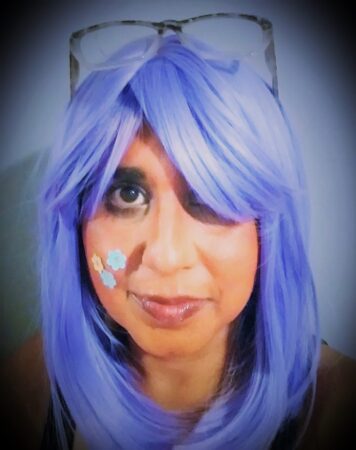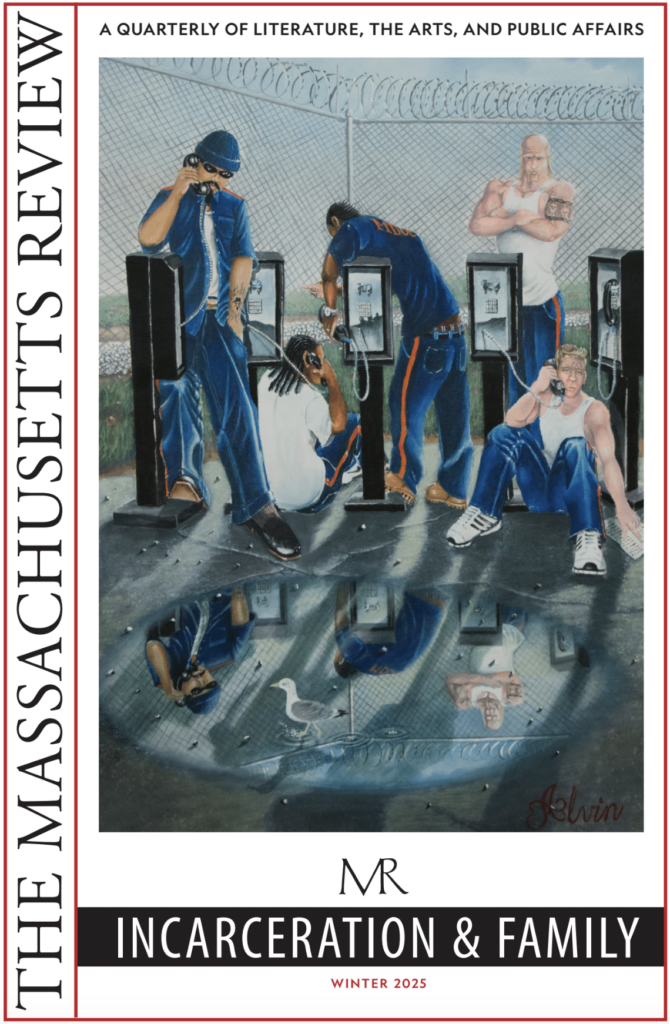10 Questions for Kalpita Pathak

Detective Varela calls it an interview room, but it looks an awful lot like the interrogation rooms in Law and Order. Over-airconditioned, scuffed floors, grubby walls, one-way mirror, rickety chair to keep you on edge. Paper coffee cups litter the tabletop. Goosebumps popping on your arms and legs, rubbing against your soft Baby Yoda leggings and green sweater.
—from Kalpita Pathak’s “For the Trees,” Volume 66, Issue 2 (Summer 2025)
Tell us about one of the first pieces you wrote.
I wrote a collection of short stories (Kalpita the Keen Kitten – I have always loved alliteration!) when I was in third grade. My teacher bound it and I still have both it and its sequel: Kalpita the Keen Kitten II (inspired title, I know!).
The stories were fantasy-adventures, about a kitten, Kalpita, and her friend, a winged unicorn. They are so important to me as an autistic writer and human for two main reasons:
- It refutes the persistent stereotype that autistic people lack creativity and imagination. In fact, artistic endeavors such as these story collections likely delayed my autism diagnosis (by decades). I was too brown, too afab, too chatty, and too imaginative to even be considered autistic. But I am autistic and creative and these precious (to me) stories reflect both qualities.
- Because I was diagnosed so late, I didn’t get the support and accommodations I needed to flourish. I say this factually, not self-pityingly. My life has taken many strange and often wonderful tangents. But, I look back at these two collections of short stories and feel so blessed to be reminded that I have always been a writer, even if I didn’t follow a more traditional path to a writing career.
What writer(s) or works have influenced the way you write now?
I say with all sincerity that I am a very active reader and everything I read informs me as a writer.
More specifically, I have been devouring Aimee Nezhukumatathil’s stunning poetry. I fall into her poems, swept up into each one’s odyssey. Like me, she incorporates nature into her work and seems to enjoy research. I admire the way she puts it all together so seamlessly. No matter how unexpected the next image is, I am never pulled out of the poem. I have absolute trust in her and will willingly follow wherever the poem leads. This is something I hope to accomplish with my own poetry.
As for fiction, N.K. Jemisin is someone whose work I return to over and over again. Every time I re-read the Broken Earth series, I learn something new. Her craft is extraordinary. From themes, to world-building, to believable speculative elements, to voice, to plot … every choice she makes is intentional and skillful. When I think of the blueprint of that series, I see a complex architectural marvel that is hidden behind an imminently readable story. Masterful work that teaches me with every turn of the page.
What other professions have you worked in?
I have worked in retail, human medicine, veterinary medicine, entomology, space sciences, traditional education, and non-traditional education. One of my favorite jobs was as an educator at a natural history museum, combining my love of science and teaching young people.
What did you want to be when you were young?
A writer. An astronaut. A field biologist. An actor.
What inspired you to write this piece?
I wanted to tell a story that honors an authentic autistic experience.
Media still gets so much wrong about autistic people. It dehumanizes us, turns us into devices—brilliant, eccentric, magical, supernatural, inspirational, burdensome—to further others’ stories. We are stereotyped as unpredictably violent, equipped with superpowers, and doomed, trapped inside a “shell” of autism (talk about dehumanizing!).
Those misperceptions carry over into society. It’s dangerous for us out there.
I wanted to more accurately portray meltdowns, the way we process the world, and how we struggle but also find contentment and joy. Of course, autism isn’t monolithic, but there is still a shared, true experience that I tried to capture.
Finally, I love detective stories but am weary of the think-outside-the-box, lone wolf, idiosyncratic, white male hero always solving the case. Sometimes he’s autistic-coded but romantically so, with his love of jazz or cooking, his mysterious solitary ways, his perpetual loneliness in the bright lights of the big city.
Ahem, this may or may not describe aspects of my life, too (albeit without the sexy intrigue).
And that’s the point. There is a reason this character-type resonates with readers: its reflective of the human condition. The unconditional human condition, not exclusive to white men.
Akshi (the protagonist in my story) also thinks outside the box and is lone wolfish—maybe for different reasons, but hopefully she is still relatable, or at least understandable and worthy of compassion, the way all humans are.
Is there a city or place, real or imagined, that influences your writing?
The Sonoran and Baja California deserts are in my soul and frequently find their way into my writing.
I have several stories and one novel that takes place in the fictional town of La Paz in southern California.
I find myself regularly and happily visiting India—especially Delhi, Mumbai, Ajmer, and the Himalayas—in my writing, as well.
Is there any specific music that aids you through the writing or editing process?
My brain can’t handle too much input—however disparate—at once. I’m a can-you-turn-the-volume-up-the-lights-are-too-bright-for-me-to-hear kind of person. So I typically need silence or I’ll play a rain video that has consistent sound, no variance (basically a rainy silence). The sounds that do enhance my writing/editing processes are birds singing, wind rustling through leaves, and/or my dogs snoring.
Do you have any rituals or traditions that you do in order to write?
I am disabled and homebound. I have a daily routine that I follow that gives me three scheduled times to write: mid-morning, mid-afternoon, and late night. This routine is ritualistic (first this then that then the next, etc.) and involves caring for my home, my family, myself (physical therapy), and writing.
I write everyday (on scraps of paper and my computer, in my mind and journals) but without my routine I flounder. My executive function is anchored by routine.
If you could work in another art form what would it be?
I would be an actor. My first paying job (in high school) was as an actor in a troupe that went from school to school performing PSA plays. I loved it.
What are you reading right now?
I subscribe to a number of literary magazine newsletters, which means I get poems and stories in my inbox on a daily basis! Every morning I drink tea and read inventive and inspiring pieces. I love connecting with writers on social media and sharing my appreciation of their work. Such a treat, communicating with someone who created something in their minds and put it out in the world. I am a stranger to them but they have changed my life in some way.
A few books I am reading or have recently read/re-read:
- Green Dot by Madeleine Gray
- When We Were Sisters by Fatimah Asghar
- The Parted Earth by Anjali Enjeti
- Skin Over Milk by Sara Chansarkar
- The American Daughters by Maurice Carlos Ruffin
- The Incendiaries by R.O. Kwon
- Rest is Resistance by Tricia Hersey
- The Boy Beneath My Skin: A Black Trans Man Living in the South by Charley Burton
- Unmasking Autism: Discovering the New Faces of Neurodiversity by Devon Price
A few poets whose work I have been recently reading/re-reading:
- Ada Limón
- Nikki Giovanni
- Audre Lorde
- Sharon Olds
- Lucille Clifton
- Alberto Ríos
- Ocean Vuong
- Brandon Som
- Jay Deshpande
KALPITA PATHAK is an autistic, disabled, queer Indian-American writer. Her work explores the perseverance of hope in a sometimes despairing world. She received the James Michener Fellowship for her MFA in creative writing and has taught students of all ages in traditional and nontraditional educational settings. Her poetry has been published in several magazines, including Autumn Sky Daily, San Pedro River Review, Unbroken, and South Dakota Review (2025). Her short fiction was shortlisted for the SmokeLong Quarterly Award for Flash Fiction 2024. “For the Trees” is Kalpita’s fiction debut.



